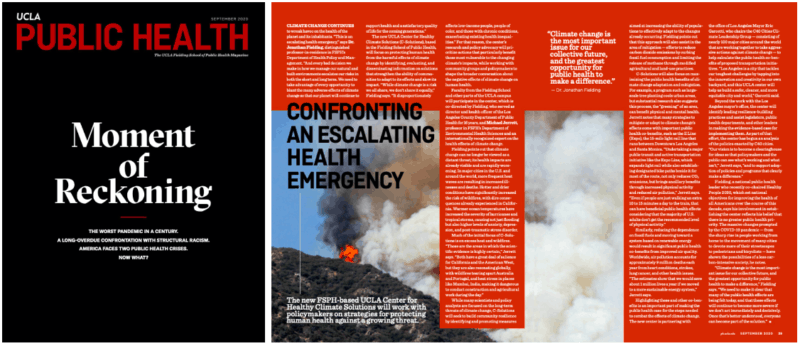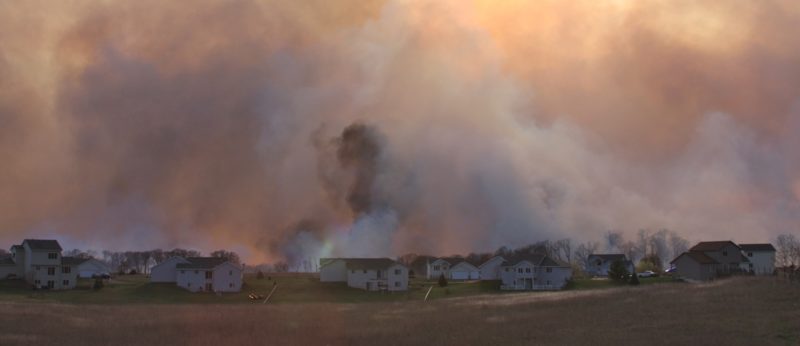CLIMATE CHANGE CONTINUES TO WREAK HAVOC ON THE HEALTH OF THE PLANET AND ITS INHABITANTS. “This is an escalating health emergency,” says Dr. Jonathan Fielding, distinguished professor-in-residence in FSPH’s Department of Health Policy and Management. “And every bad decision we make in how we manage our natural and built environments escalates our risks in both the short and long term. We need to take advantage of every opportunity to blunt the many adverse effects of climate change so that our planet will continue to support health and a satisfactory quality of life for the coming generations.”
The new UCLA Center for Healthy Climate Solutions (C-Solutions), based in the Fielding School of Public Health, will focus on protecting human health from the harmful effects of climate change by identifying, evaluating, and disseminating information on solutions that strengthen the ability of communities to adapt to its effects and slow its impact. “While climate change is a risk we all share, we don’t share it equally,” Fielding says. “It disproportionately affects low-income people, people of color, and those with chronic conditions, exacerbating existing health inequalities.” For that reason, the center’s research and policy advocacy will prioritize actions that particularly benefit those most vulnerable to the changing climate’s impacts, while working with community groups and policymakers to shape the broader conversation about the negative effects of climate change on human health.
Faculty from the Fielding School and other parts of the UCLA campus will participate in the center, which is co-directed by Fielding, who served as director and health officer of the Los Angeles County Department of Public Health for 16 years, and Michael Jerrett, professor in FSPH’s Department of Environmental Health Sciences and an internationally recognized expert on the health effects of climate change.
Fielding points out that climate change can no longer be viewed as a distant threat; its health impacts are already visible and are rapidly worsening. In major cities in the U.S. and around the world, more frequent heat waves are resulting in increased illnesses and deaths. Hotter and drier conditions have significantly increased the risk of wildfires, with dire consequences already experienced in California. Warmer ocean temperatures have increased the severity of hurricanes and tropical storms, causing not just flooding but also higher levels of anxiety, depression, and post-traumatic stress disorder.
Much of the initial focus of C-Solutions is on excess heat and wildfires. “Those are the areas in which the scientific evidence is highly certain,” Jerrett says. “Both have a great deal of salience for California and the American West, but they are also resonating globally, with wildfires tearing apart Australia and Portugal, and heat stress in places like Mumbai, India, making it dangerous to conduct construction and agricultural work during the day.”
While many scientists and policy analysts are focused on the long-term threats of climate change, C-Solutions will seek to build community resilience by identifying and promoting measures aimed at increasing the ability of populations to effectively adapt to the changes already occurring. Fielding points out that this approach will also assist in the area of mitigation — efforts to reduce carbon dioxide emissions by curbing fossil fuel consumption and limiting the release of methane through modified agricultural and land-use practices.
C-Solutions will also focus on maximizing the public health benefits of climate change adaptation and mitigation. For example, a program such as large scale tree planting cools urban areas, but substantial research also suggests this process, the “greening” of an area, can benefit physical and mental health. Jerrett notes that many strategies to mitigate or adapt to climate change’s effects come with important public health co-benefits, such as the E Line (Expo), the 15-mile light rail line that runs between Downtown Los Angeles and Santa Monica. “Undertaking a major public transit and active transportation initiative like the Expo Line, which expands light rail while also establishing designated bike paths beside it for most of the route, not only reduces CO2 emissions, but brings ancillary benefits through increased physical activity and reduced air pollution,” Jerrett says. “Even if people are just walking an extra 10 to 15 minutes a day to the train, that can have beneficial public health effects considering that the majority of U.S. adults don’t get the recommended level of physical activity.”
Similarly, reducing the dependence on fossil fuels and moving toward a system based on renewable energy would resultin significant public health co-benefits from improved air quality. Worldwide, air pollution accounts for approximately 9 million deaths each year from heart conditions, strokes, lung cancer, and other health issues. “The estimates show that we would save about 1 million lives a year if we moved to a more sustainable energy system,” Jerrett says.
Highlighting these and other co-benefits is an important part of making the public health case for the steps needed to combat the effects of climate change. The new center is partnering with the office of Los Angeles Mayor Eric Garcetti, who chairs the C40 Cities Climate Leadership Group— consisting of nearly 100 major cities around the world that are working together to take aggressive actions against climate change — to help calculate the public health co-benefits of proposed transportation initiatives. “Los Angeles is a city that tackles our toughest challenges by tapping into the innovation and creativity in our own backyard, and this UCLA center will help us build a safer, cleaner, and more equitable city and world,” Garcetti said.
Beyond the work with the Los Angeles mayor’s office,the center will identify leading resilience-building practices and assist legislators, public health departments, and other leaders in making the evidence-based case for implementing them. As part of that effort, the center has begun an analysis of the policies enacted by C40 cities. “Our vision is to become a clearing house for ideas so that policymakers and the public can see what’s working and what isn’t,” Jerrett says, “and to support adoption of policies and programs that clearly make a difference.”
Fielding, a national public health leader who recently co-chaired Healthy People 2030, which set national objectives for improving the health of all Americans over the course of this decade, says his involvement in establishing the center reflects his belief that there is no greater public health priority. The massive changes prompted by the COVID-19 pandemic — from the sharp rise in people working from home to the movement of many cities to devote more of their streetscapes to pedestrians and bicyclists — have shown the possibilities of a less carbon-intensive society, he notes.
“Climate change is the most important issue for our collective future, and the greatest opportunity for public health to make a difference,” Fielding says. “We need to make it clear that many of the public health effects are being felt today, and that these effects will continue to become more severe if we don’t act immediately and decisively. Once that’s better understood, everyone can become part of the solution.”
View this article in the UCLA Public Health Magazine, September 2020 issue:








